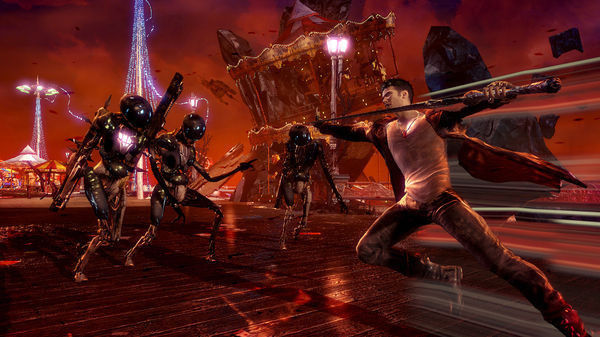Granted, I wasn't ever a super-fan, and I certainly wasn't one of the people who reacted so incredulously to the direction Ninja Theory were heading in, and quite liked the look of alternate-reality-Dante from the very first images of him. But I have always liked the brunt of the series - the first one was good, the third one much better, while the second and forth were a notable dive in quality. DmC takes the potential the series has always shown and throws it into the modern world, adding a coat of shine and sleekness.
 |
| Not your everyday trip through limbo |
It's not immediately endearing, though. The opening credits had me more than a little worried, as they flickered between gratuitous images of scantily-clad women dressed as angels and demons all dancing erotically for Dante's pleasure - and eventually doing more than just dancing. I suppose it was meant to showcase what sort of character this Dante fellow is - the angel and demon imagery overtly mirroring Dante's own half-angel, half-demon genetics, while the sexual imagery let us know just how deviant he was. It just felt unnecessary, though - sexual provocation for sexual provocation's sake - and thankfully it wasn't a tone that carried through the rest of the game.
Any feeling of ill towards DmC immediately evaporates as soon as you're faced with your first demon and it's the flow of the combat that makes it work so well. It's what the game revolves around for the most part - shepherding you between closed-off environments before spawning waves of enemies and tasking you to despatch them with your various demonic/angelic weapons - and from a distance, it looks no different to what we've already seen in past Devil May Cry games, and every third-person hack-n-slash since.
But there is a difference, and it lies in the execution. You never feel like your movement is stilted by a wrongly timed attack, and while some may say that the lower pressure to pull off complex and precise combos makes it easier, it actually just makes it a tad more forgiving: pulling off epic combos without getting hit is still the best way to go about business, but now you're given a bit more leeway, and can easily transition into a brand new combo as soon as the last one comes to completion or is broken.
It isn't until the final few chapters that you really feel explicitly challenged, but the previous ones do offer challenge in the form of the online leaderboards. Killing enemies with the maximum style points is what you'll really be aiming for, and Dante is well-equipped to perform a choreographed dance of death at a frantic pace, juggling multiple enemies in the air and rapidly manoeuvring between targets, as DmC always challenges you to perfect a longer combo and climb your way up the leaderboards.
Style points are also awarded for level completion time and the amount of hidden goodies you find, so exploring quickly is a must. You navigate levels using Dante's angelic and demonic whips, the former letting you pull yourself towards platforms, while the latter allows you to manipulate the environment and pull platforms into your path. It makes for surprisingly satisfying platforming, and you'll need to combine the two together, along with Dante's aerial boost ability, to reach the most inaccessible areas in the game.
 |
| Despite the Union Jack-emblazoned jacket, Dante is not an accurate representation of the UK's general populace |
Where you fight is just as impressive as the fighting itself, as Dante finds himself battling through limbo. This isn't a grey and miserable interpretation of purgatory that is found in most other places, but a reality-bending interpretation, where limbo simply represents a warped mirror on our own world, allowing Ninja Theory to exercise no creative caution with their level design. You go from fire-and-brimstone variants of hell with a rock backing-track, to Tron-like sequences inside a television studio, where electronic music fills your ears.
It's fantastically varied and while the constant shift in environment has the potential to provide an anarchic and ultimately dizzying change of direction, the limbo justification provides just enough thread to tie everything together without making you question it.
The visual design is also the only thing that saves boss fights from being exercises in tedium. They follow your basic boss-fight structure: learn an attack pattern; dodge said pattern until you can expose and attack a weak spot; rinse and repeat when the boss enters a new phase until it's lying dead on the floor, but while the combat borders on repetitiveness in these segments, fighting a giant demonic baby or a huge, holographic anchor man's head keeps it interesting.
Dante is the same old Dante, even in spite of a new haircut and punk-ish dress code. Killing demons to him is just something that's there to be done, and every foe is dispatched with a nonchalant quip that Arnie himself would be proud of penning. His attitude is balanced by super-serious twin-brother Vergil, while humanity's sole good representative in proceedings, Kat, adds an extra dimension to Dante, allowing both characters to throw exposition off one another, while also providing a bit more emotional motivation than just the core save-humanity/revenge storyline.
While it's mostly positive, there are a few problems - the biggest being that it almost suffers from its own damn sense of cool, tantalising you with fantastic set-pieces that showcase Dante as the epitome of effortless bad-assery, but always taking the best bits out of your grasp and saving them for cutscenes - it's perhaps one of the few occasions where I've found myself wishing there were QTEs present, as in such a cutscene-heavy game it would've been nice to have been given the opportunity to feel like you're more in control of Dante's coolest moments.
 |
| There's something vaguely familiar about Dante's look in Devil Trigger mode... |
The story itself is also predictable, and while it makes an attempt at providing some sort of critique on modern society, it feels lazily done, and doesn't say anything that hasn't been said a thousand times before and in a thousand better ways. However, it's not really supposed to be taken seriously, and much of it is self-evidently camp, providing a tale of revenge and global conspiracy, without ever becoming needlessly convoluted.
Platform Played: Xbox 360
DMC: DEVIL MAY CRY VERDICT
For my reckoning, Devil May Cry fans do not have anything to fear. DmC does a fantastic job of being immediately recognisable as a game belonging to the franchise, while also providing an experience that will introduce those unfamiliar to it. It’s sleek and cool, providing a frantic and flowing combat system that underlies and defines it from the get-go. Dante doesn’t just look cooler, he plays cooler, and this may well be the series’ finest hour.
TOP GAME MOMENT
Smashing in the digitised face of the oh-so-smug digitised anchorman with a effortless quip.




